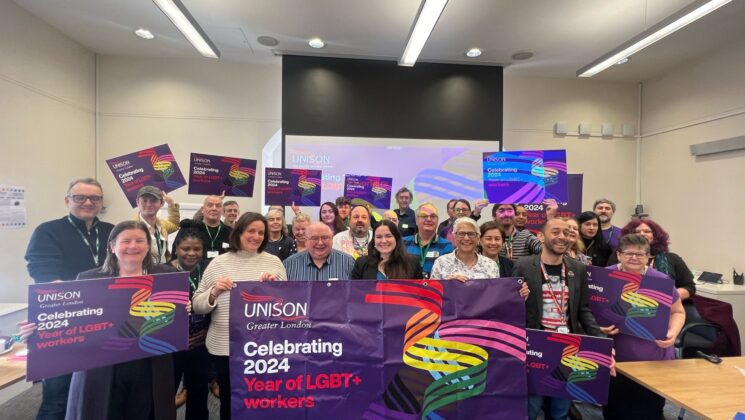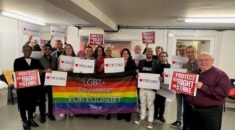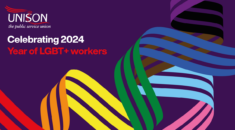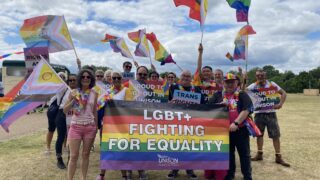It was an opportunity for all activists, regardless of whether they identify as LGBT+ or not, to come together and equip themselves with tools and resources to campaign and bargain during Year of LGBT+ Workers and beyond.
Anu Prashar, Co-Chair of the regional LGBT+ opened the day and welcomed over 40 activists from across the region.
Jo Galloway, Regional Secretary, was the first guest speaker of the day, and introduced why Year of LGBT+ Workers is such an important campaign for the union. She highlighted that as a result of the motion submitted to Regional Council AGM, all branches were asked to participate in Year of LGBT+ Workers and organise around the issues faced by the LGBT+ community. Jo encouraged activists to ensure LGBT+ member participation both at branch, regional and national level were considered a priority for the year.
UNISON’s guidance on becoming an LGBT+ Officer and setting up a branch Self-Organised Group (SOG) can be found here.
Jo went on to highlight that the LGBT+ people earn on average 16% less than their peers. This effectively means they are paid around £6,703 less per year on average. She encouraged activists to utilise UNISON’s Pay Gaps Bargaining Guide, which includes ideas for branches on how they can organise around this issue.
Attendees then went into their first workshop of the day.
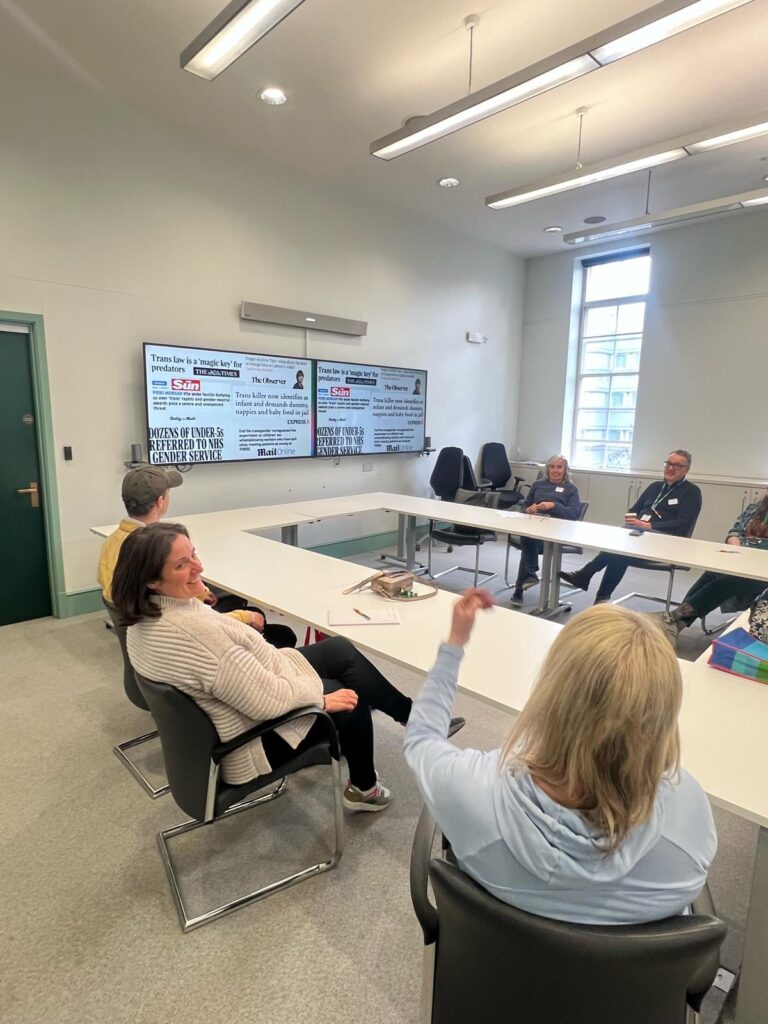
The ‘How to negotiate a trans equality policy’ workshop was hosted by Mitch Coe, National LGBT+ Officer, and Jenny Black, Co-Chair of the Trans, Non-binary and Gender Diverse network. One of the main priorities for the LGBT+ Committee is the rolling out of the Trans Equality campaign and equipping branches with the tools they need to negotiate UNISON’s model trans equality policy.
We’ve unfortunately seen a sharp rise in far-right politics, where trans rights are being used as a political ‘football’ – particularly with a general election on the horizon. Trade unions play a key role in resisting this – not just because it’s the right thing to do, but because trans rights are workers’ rights. As part of Year of LGBT+ Workers and beyond, all branches are encouraged to consider how they can be good trans allies, which includes promoting UNISON’s trans workers rights factsheet and facilitating ‘How to be a good trans ally’ training – branches can email outinlondon@unison.co.uk for support with this.
Anu Prashar, Co-Chair of the regional LGBT+ Committee hosted the next workshop; ‘Encouraging LGBT+ participation in elections’. With the London Mayoral and London Assembly elections around the corner (Thursday 2 May 2024), and a general election looming, we must ensure workers are equiped with the knowledge to vote and oust the Conversative government; which over the past 14 years in power has been responsible for one of the largest declines in LGBT+ rights. The International Lesbian, Gay, Bisexual, Trans and Intersex Association (ILGA)’s annual rainbow map ranks Europe’s countries based on how LGBT+ friendly they are – considering both their legal and policy situation.
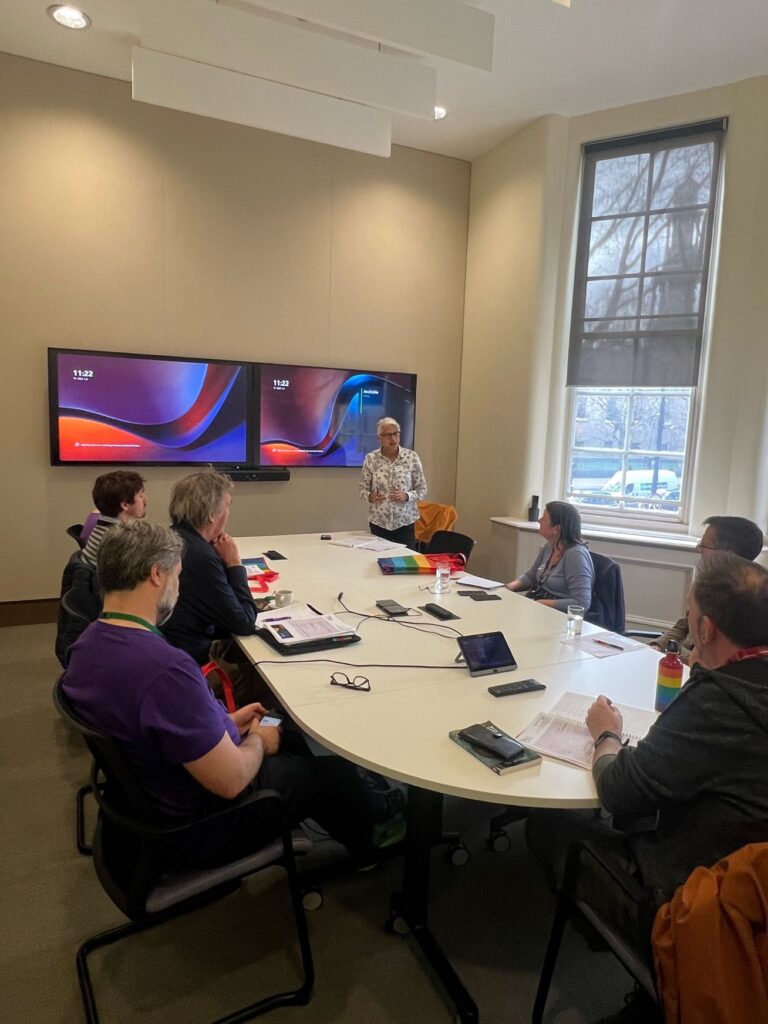
Up until 2015, the UK was consistently ranked the most LGBT+ friendly place in Europe and was leagues ahead of other nations in terms of rights, protections, and freedoms afforded to LGBT+ people. However from 2016 onwards, the UK continued to drop down the list each year and now stands at 17th position – out of 49 countries.
There are many barriers in place for LGBT+ people to be able to vote in the elections, such as threat of violence, familial and social disaproval, reduced access to support services, challenges finding secure housing; to name a few.
This is further exacerbated by the Voter Identification Regulations 2022, whereby voters will now be required to show ID when voting. This has the potential to restrict LGBT+ participation in elections even further, as many might not identify with how they appear on governement approved forms of ID. This could discourage our trans, non-binary and gender diverse members from exercising their democratic right.
Members are encouraged to check they have a valid form of ID, register for a Voter Authority Certificate if necessary, or register for a postal vote. The deadline to register for a postal vote ahead of the London Mayoral and Assembly elections is Wednesday 17 April. The deadline to register for a Voter Authority Certificate is Wednesday 24 April.
The third workshop was ‘HIV awareness and the law’, hosted by Ant Babajee, regional LGBT+ Committee member and HIV activist, and Rosie Sammut, regional LGBT+ Committee Secretary.
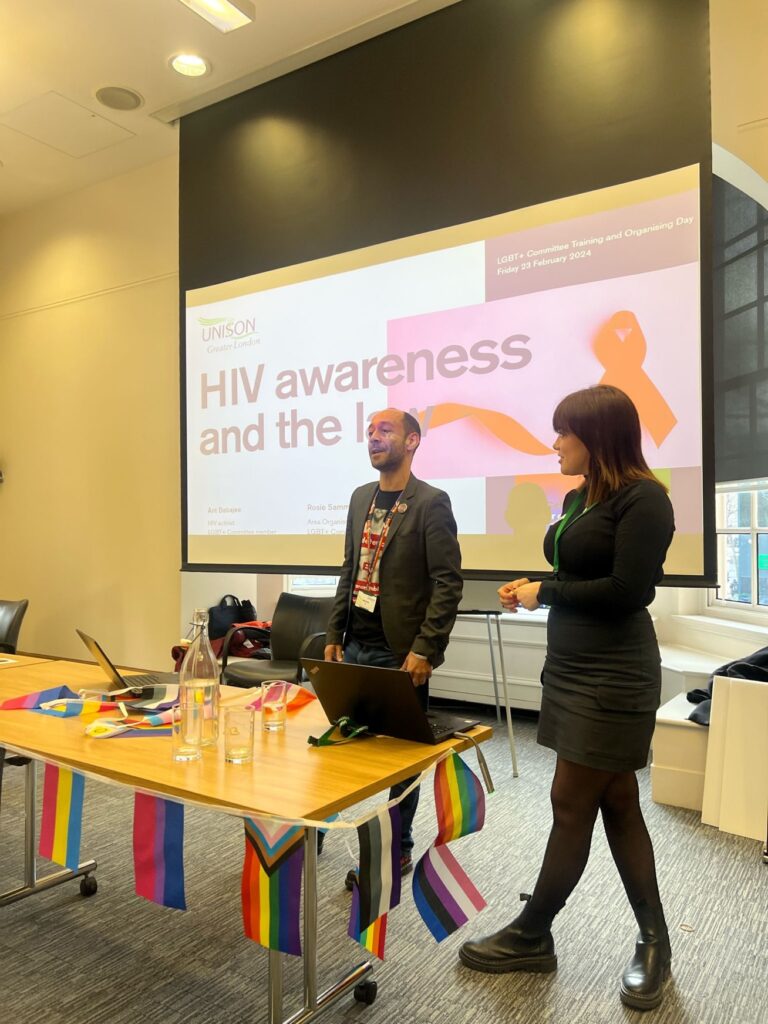
It’s estimated 95,900 people are living in the UK as of 2021, and of these 4,400 do not know they are living with HIV. Anyone can contract HIV, but people from some communities are disproportionately affected, in particular men who have sex with men and Black African people.
London continues to have the highest rates of HIV in England: 32% of new diagnoses on 2021 were London residents. Of those diagnosed in 2021, 44% were diagnosed late. Some groups are more likely to be diagnosed late; 63% of heterosexual men, 56% of Black African ethnicity, and 50% of women were all diagnosed late.
As a result of the regional LGBT+ Committee’s motion to National LGBT+ Conference, there are various objectives and actions the regional Committee is trying to promote as part of Year of LGBT+ Workers.
- Promote language used in the People First Charter, and encourage activists/branches to review employer policies to ensure the language used is inclusive. The People First Charter aims to put the person before their condition, recognising that inclusive language matters, especially if we want to remove the stigma of getting tested for, or having HIV.
- Raise awareness of the protections afforded to people with HIV under the Equality Act 2010 – workers are entitled to protections under the disability protected characteristic from the moment they are diagnosed.
- Encourage the adoption of the HIV Confident Charter by employers, which aims to reduce HIV stigma. Despite all the advances in clinical care, life for people with HIV can be difficult because of stigma and discrimination.
- Promote and support the Terrence Higgin’s Trust (THT) 2030: HIV Time’s Up! Campaign whereby they are aiming to end new HIV transmissions by 2030 in the UK. Their mission is to test everyone living with HIV in the UK – people living with HIV who are on treatment can’t pass it on.
Attendees then welcomed Danny Beales, Camden Councillor and prospective parliamentary candidate for Uxbridge and South Ruislip. Danny spoke about the vital relationship trade unions have with the Labour Party, and if we want equalities back on the agenda – we must elect a Labour government at the next general election. He went on to inform delegates of the proud LGBT+ history Labour has – and urged attendees to help Labour get the vote out so the Labour Party can continue to build a legacy for working people.
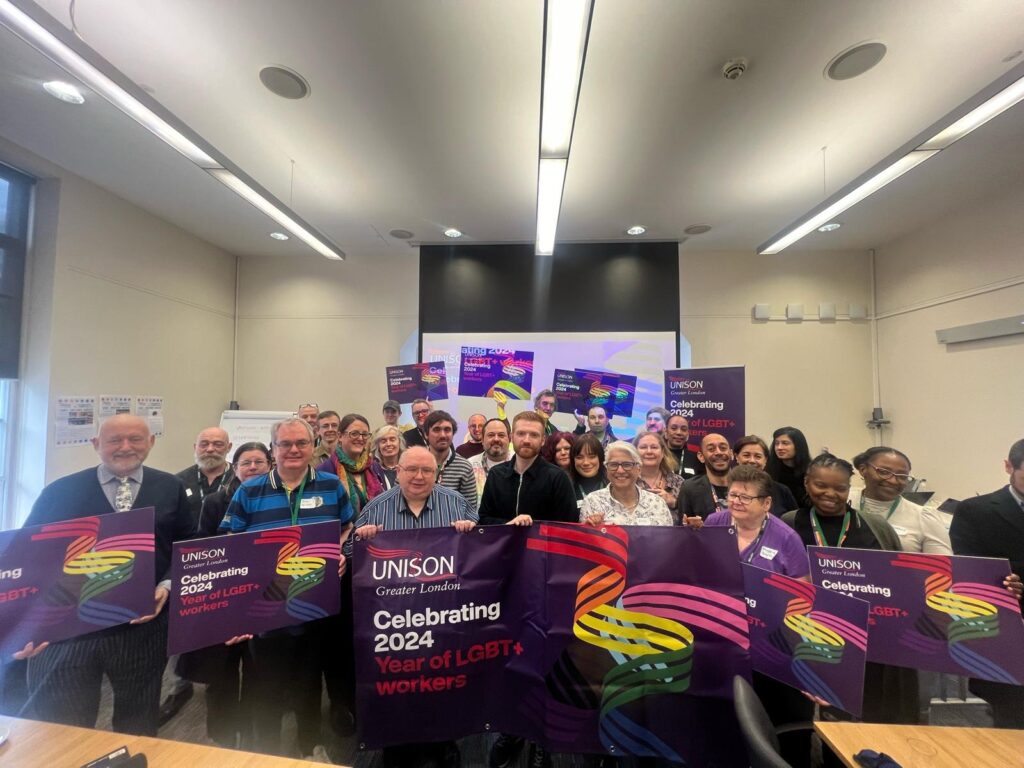
Attendees then attended an alternation of the morning workshops, and headed back to the main room for a round-up – led by Terry Eastham, regional LGBT+ Committee Co-Chair.
Terry reminded attendees of the regional campaign page for Year of LGBT+ Workers, as well as encouraged them to sign up to the LGBT+ mailing list to stay up to date with LGBT+ activities in London. Attendees were asked to commit to one action they would take back to their branches as a result of the day, and responses ranged from setting up a branch LGBT+ SOG, to negotiating a Trans Equality policy, encouraging their employer to sign up to the HIV Confident Charter and many more. Activists were encouraged to let us know what they’re doing in their branches by submitting details to the form on our campaign page, or emailing outinlondon@unison.co.uk
Terry reflected on the event by saying “The training and organising day is a really important day in our calendar as it’s a chance for all UNISON members irrespective of their gender identity or sexual orientation to come along and find out what the UNISON LGBT+ network is doing. As well as that, there is the opportunity to take part in workshops on a range of LGBT+ related subjects, to give the attendees something concrete to take back to their branches. It also highlights the need for LGBT+ and Equality officers in branches and, in the Year of LGBT+ Workers, the day gives everyone a chance to see how they and their branch will be able to contribute to a successful and fruitful year.”.
Anu added, “the day was fun and enjoyable and it was great to see the enthusiasm in the room to make the Year of LGBT+ Workers in the Greater London region a success!
To find out more about Year of LGBT+ Workers, visit the campaign page here.
For support organising around Year of LGBT+ Workers in your branch, speak to your Regional Organiser or email outinlondon@unison.co.uk

